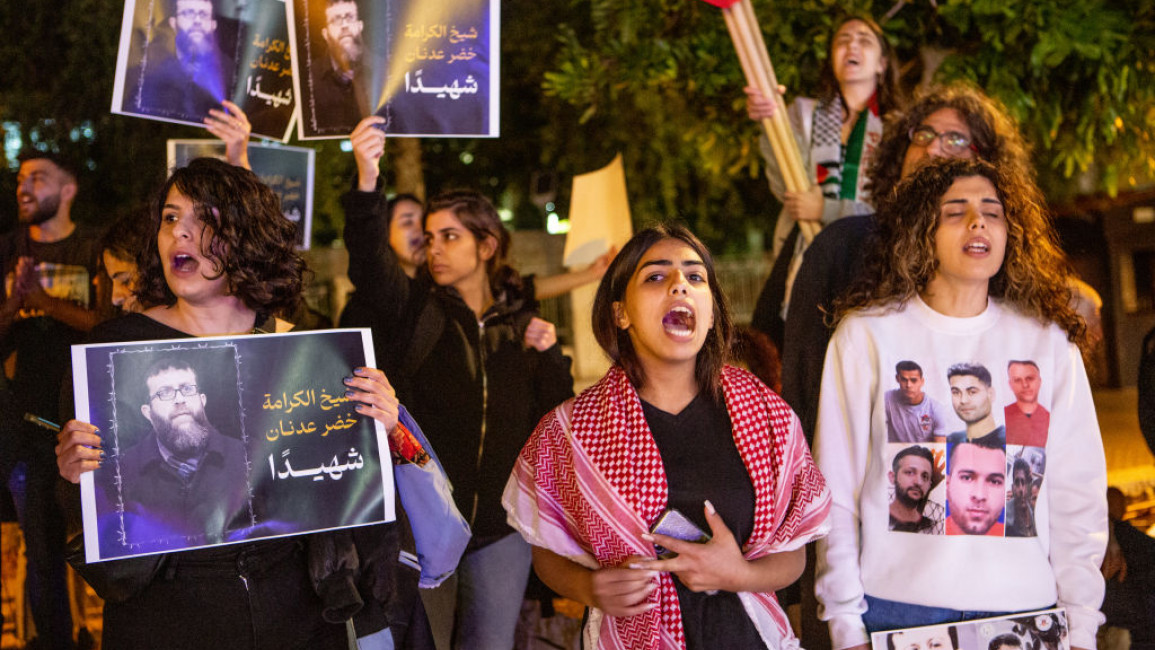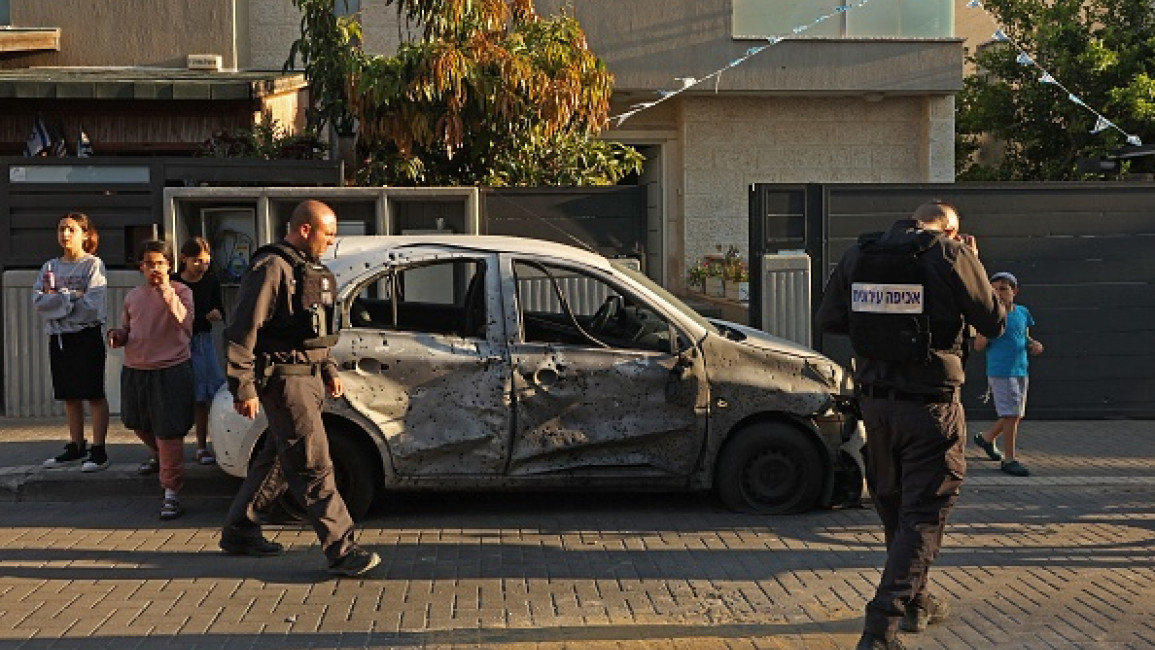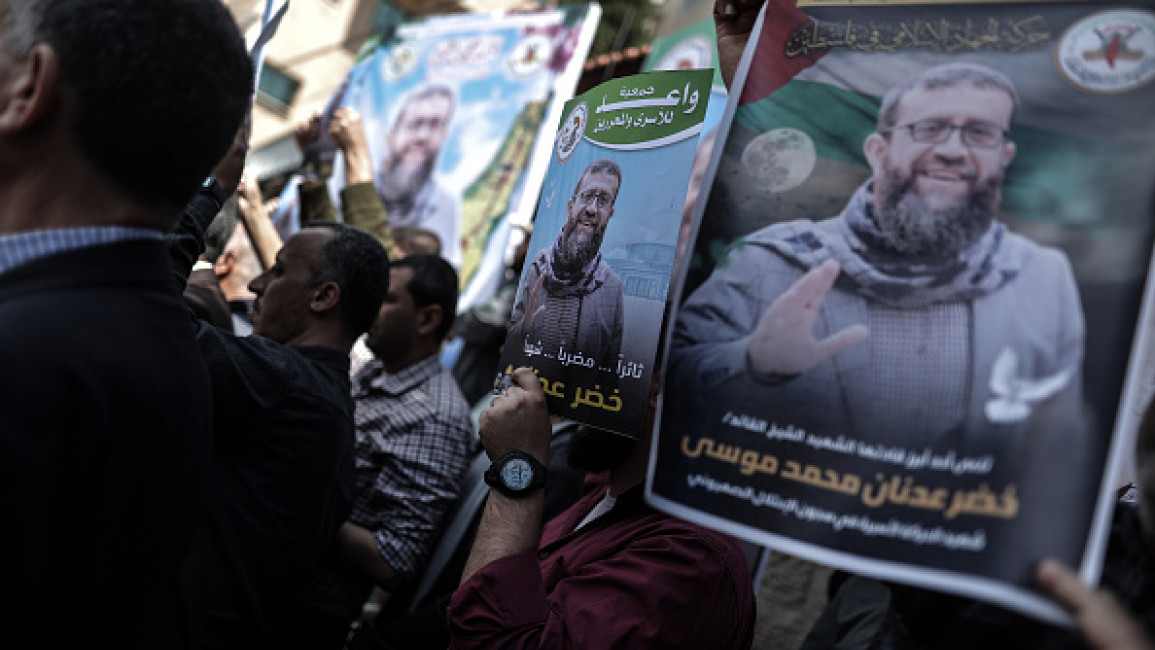Islamic Jihad announces truce after rocket fire with Israel in response to Khader Adnan's death
Agencies
03 May, 2023
A string of high-profile hunger strikes during at least 13 stints in Israeli custody had turned Adnan into a national hero and revitalised hunger strikes as a form of protest among Palestinians incarcerated in Israeli jails.

Palestinian militant group Islamic Jihad announced a truce around Gaza Wednesday after militants traded fire with Israel following the death in Israeli custody of Khader Adnan from a hunger strike after 87 days.
Mediators from Qatar, Egypt and the United Nations intervened to broker a return to calm from 4 am (0100 GMT), sources in Islamic Jihad and fellow militant group Hamas told AFP.
Israel did not immediately confirm the agreement.
The Israeli army said the last warning sirens sounded near the Gaza border at around 5:30 am (0230 GMT).
Witnesses in the blockaded Palestinian territory told AFP that several rockets were fired at Israel around this time.
"One round of confrontation has ended, but the march of resistance continues and will not stop," said Tariq Salmi, a spokesperson for Islamic Jihad in a statement.
"Our brave fighters have proven their loyalty and commitment to defending their people," he added.
Hamas chief Ismail Haniyeh demanded that Israel return the hunger striker's body to his family.
"We stress - and as we have informed all the mediators who intervened - the necessity of handing over the body of the martyr Khader Adnan to his patient family," Haniyeh said in a statement.
Adnan, 45, from Jenin in the occupied West Bank, died early Tuesday after an 87-day hunger strike following his arrest by Israel over ties to Islamic Jihad - he was under 'administrative detention' and never charged.
He was one of the most prominent Palestinian prisoners behind bars in Israel.
A string of high-profile hunger strikes during at least 13 stints in Israeli custody had turned Adnan into a national hero and revitalised hunger strikes as a form of protest among Palestinians incarcerated in Israeli jails.
From Tuesday morning, around 100 rockets were fired by militant groups from Gaza towards Israel, according to Islamic Jihad.
The Israeli army claimed it carried out a number of air strikes on Gaza early Wednesday, targeting "weapons manufacturing sites, outposts, military complexes and an underground terror tunnel" belonging to Hamas.
"It (Hamas) will face the consequences," the army added.
Israel generally holds Hamas responsible for all rocket fire from Gaza, regardless of which militant group launched it. The Islamist group has controlled the territory since ousting loyalists of Palestinian president Mahmud Abbas in 2007.
Agencies
03 May, 2023
A string of high-profile hunger strikes during at least 13 stints in Israeli custody had turned Adnan into a national hero and revitalised hunger strikes as a form of protest among Palestinians incarcerated in Israeli jails.

Palestinian militant group Islamic Jihad announced a truce around Gaza Wednesday after militants traded fire with Israel following the death in Israeli custody of Khader Adnan from a hunger strike after 87 days.
Mediators from Qatar, Egypt and the United Nations intervened to broker a return to calm from 4 am (0100 GMT), sources in Islamic Jihad and fellow militant group Hamas told AFP.
Israel did not immediately confirm the agreement.
The Israeli army said the last warning sirens sounded near the Gaza border at around 5:30 am (0230 GMT).
Witnesses in the blockaded Palestinian territory told AFP that several rockets were fired at Israel around this time.
"One round of confrontation has ended, but the march of resistance continues and will not stop," said Tariq Salmi, a spokesperson for Islamic Jihad in a statement.
"Our brave fighters have proven their loyalty and commitment to defending their people," he added.
MENAThe New Arab Staff
Hamas chief Ismail Haniyeh demanded that Israel return the hunger striker's body to his family.
"We stress - and as we have informed all the mediators who intervened - the necessity of handing over the body of the martyr Khader Adnan to his patient family," Haniyeh said in a statement.
Adnan, 45, from Jenin in the occupied West Bank, died early Tuesday after an 87-day hunger strike following his arrest by Israel over ties to Islamic Jihad - he was under 'administrative detention' and never charged.
He was one of the most prominent Palestinian prisoners behind bars in Israel.
A string of high-profile hunger strikes during at least 13 stints in Israeli custody had turned Adnan into a national hero and revitalised hunger strikes as a form of protest among Palestinians incarcerated in Israeli jails.
MENAQassam Muaddi
From Tuesday morning, around 100 rockets were fired by militant groups from Gaza towards Israel, according to Islamic Jihad.
The Israeli army claimed it carried out a number of air strikes on Gaza early Wednesday, targeting "weapons manufacturing sites, outposts, military complexes and an underground terror tunnel" belonging to Hamas.
"It (Hamas) will face the consequences," the army added.
Israel generally holds Hamas responsible for all rocket fire from Gaza, regardless of which militant group launched it. The Islamist group has controlled the territory since ousting loyalists of Palestinian president Mahmud Abbas in 2007.
The New Arab Staff
02 May, 2023
Palestinian hunger striker Khader Adnan's death on Tuesday prompted a barrage of rocket attacks from Gaza into Israel.

Palestinian resistance factions in Gaza announced Tuesday that they had targeted Israeli settlements with rocket fire, in response to the death following a hunger strike of Palestinian prisoner Khader Adnan, warning of further action if needed.
The joint operations unit of Palestinian groups in the besieged coastal enclave said they bombed Israeli towns within the vicinity of the Gaza Strip, such as Sderot, in an initial response to "the assassination of Commander Khader Adnan" who they described as a national hero.
Adnan was pronounced dead on Tuesday after spending 87 days on hunger strike in administrative detention. He was one of the most prominent Palestinian prisoners behind bars in Israel.
Adnan was a senior official in the Palestinian Islamic Jihad movement, which is the second largest Palestinian faction in Gaza after Hamas.
"This heinous crime will trigger responses from our people everywhere…with the help of God Almighty," the Palestinian fighters said, adding that "we will remain loyal to the blood of our martyrs and the sacrifices of our families, and their cause will remain a top priority for the leadership of the resistance in all circumstances."
They warned Israel that any attack against Palestinians would be met with a response.
About 25 rockets were fired from the north and south of the Gaza Strip as Israel’s Iron Dome intercepted most of them.
Plumes of black smoke could be seen from Sderot, where some of the rockets landed, causing material damage.
There were also reports of at least three injuries, with one person being seriously wounded whilst working on a construction site.
The Israeli army responded with artillery fire, targeting a monitoring point of the Palestinian resistance groups east of Gaza City. The shelling however did not lead to any injuries, the Palestinians said.
Israelis living in settlements close to Gaza were told to remain indoors for the time being.
Who was Khader Adnan, the Palestinian detainee who died on hunger strike?
The New Arab Staff
02 May, 2023
Palestinians mourned Khader Adnan, a 45-year-old prisoner who had repeatedly been detained by Israel, after he died following 87 days on hunger strike.
Palestinian prisoner Khader Adnan, who spent 87 days on hunger strike in administrative detention in Israel, was pronounced dead on Tuesday.
He is the 237th Palestinian prisoner to die in Israeli detention since 1967 and one of the best-known detainees held by Israel, being arrested and released from jail several times on what Israeli authorities described as "terror-related charges", or without charge.
When Adnan died at 45, he had spent many years of his life behind bars, in both Israeli and Palestinian prisons. Before his death on Tuesday, Adnan refused any medical treatment since beginning his hunger strike on 5 February.
Who was Khader Adnan?
Born on 24 March 1978, Adnan hailed from the town of Arraba, south of Jenin in the occupied West Bank.
He held a bachelor's degree in economics and mathematics and then joined a master's programme in economics at Birzeit University.
Adnan became a political advocate during his time at university, joining the Palestinian Islamic Jihad movement (PIJ) which was founded by Palestinian students in 1981.
He would later become a spokesperson for the Islamist group in the West Bank, where they have a limited presence compared to the Gaza Strip.
He also ran a bakery and briefly worked as a banker.
He was first arrested and held for four months by Israeli authorities in 1999.
The same year, Palestinian security forces arrested him for leading student protests against visiting French Prime Minister Lionel Jospin. He was detained by the Palestinian Authority two more times after that.
Adnan would spend years of his life in and out of Israeli prison cells.
He leaves behind nine children, the oldest of whom is 14 and the youngest only two-years-old.
Why were his hunger strikes so important?
In 2012, a 66-day hunger strike turned Adnan into a national hero and revitalised this form of protest as a legitimate form of protest against conditions and other grievances for Palestinian detainees.
At the time, it was the longest hunger strike ever staged by a Palestinian prisoner.
The 2012 protest shone a light on administrative detention, a controversial measure by Israeli authorities under which people are interned without charge for renewable periods of up to six months. Rights groups have repeatedly slammed the practice, which can see Palestinians jailed indefinitely.
In 2015, he again secured his release from Israeli custody with a 56-day hunger strike and spent another 58 days and 25 days without food in 2018 and 2021 respectively.
Four prisoners on hunger strike died in the 1970s and 1980s as they were being force-fed by Israeli authorities.
Force-feeding was outlawed until 2015 when an Israeli law allowed a judge to sanction the practice in some circumstances.
What has the response been?
The PIJ has warned Israel that it will "pay the price for this crime".
Rockets were fired from the besieged Gaza Strip following news of Adnan's death, and Israel responded with artillery fire. There were reports of some injuries in Israel.
The PIJ is one of two main armed groups in Gaza, the other being Hamas which runs the Palestinian enclave.
Hundreds of people also rallied in Gaza, paying their respects to Adnan, in a show of solidarity with other Palestinian detainees. Similar rallies were held across the West Bank and in his hometown of Arraba.
Rights groups said Israeli authorities ignored warnings that Adnan's life was in danger, but Israeli authorities said he had repeatedly refused medical treatment.
The Palestinian foreign ministry on Tuesday held Israel fully responsible for Adnan's death, calling for an international investigation into what it described as an "execution". It said it had referred his case to the International Criminal Court.
(The New Arab, Agencies)
The New Arab Staff
02 May, 2023
Palestinians mourned Khader Adnan, a 45-year-old prisoner who had repeatedly been detained by Israel, after he died following 87 days on hunger strike.

Palestinian prisoner Khader Adnan, who spent 87 days on hunger strike in administrative detention in Israel, was pronounced dead on Tuesday.
He is the 237th Palestinian prisoner to die in Israeli detention since 1967 and one of the best-known detainees held by Israel, being arrested and released from jail several times on what Israeli authorities described as "terror-related charges", or without charge.
When Adnan died at 45, he had spent many years of his life behind bars, in both Israeli and Palestinian prisons. Before his death on Tuesday, Adnan refused any medical treatment since beginning his hunger strike on 5 February.
Who was Khader Adnan?
Born on 24 March 1978, Adnan hailed from the town of Arraba, south of Jenin in the occupied West Bank.
He held a bachelor's degree in economics and mathematics and then joined a master's programme in economics at Birzeit University.
Adnan became a political advocate during his time at university, joining the Palestinian Islamic Jihad movement (PIJ) which was founded by Palestinian students in 1981.
He would later become a spokesperson for the Islamist group in the West Bank, where they have a limited presence compared to the Gaza Strip.
He also ran a bakery and briefly worked as a banker.
He was first arrested and held for four months by Israeli authorities in 1999.
The same year, Palestinian security forces arrested him for leading student protests against visiting French Prime Minister Lionel Jospin. He was detained by the Palestinian Authority two more times after that.
Adnan would spend years of his life in and out of Israeli prison cells.
He leaves behind nine children, the oldest of whom is 14 and the youngest only two-years-old.
Why were his hunger strikes so important?
In 2012, a 66-day hunger strike turned Adnan into a national hero and revitalised this form of protest as a legitimate form of protest against conditions and other grievances for Palestinian detainees.
At the time, it was the longest hunger strike ever staged by a Palestinian prisoner.
The 2012 protest shone a light on administrative detention, a controversial measure by Israeli authorities under which people are interned without charge for renewable periods of up to six months. Rights groups have repeatedly slammed the practice, which can see Palestinians jailed indefinitely.
VoicesYara M. Asi
In 2015, he again secured his release from Israeli custody with a 56-day hunger strike and spent another 58 days and 25 days without food in 2018 and 2021 respectively.
Four prisoners on hunger strike died in the 1970s and 1980s as they were being force-fed by Israeli authorities.
Force-feeding was outlawed until 2015 when an Israeli law allowed a judge to sanction the practice in some circumstances.
What has the response been?
The PIJ has warned Israel that it will "pay the price for this crime".
Rockets were fired from the besieged Gaza Strip following news of Adnan's death, and Israel responded with artillery fire. There were reports of some injuries in Israel.
The PIJ is one of two main armed groups in Gaza, the other being Hamas which runs the Palestinian enclave.
Hundreds of people also rallied in Gaza, paying their respects to Adnan, in a show of solidarity with other Palestinian detainees. Similar rallies were held across the West Bank and in his hometown of Arraba.
Rights groups said Israeli authorities ignored warnings that Adnan's life was in danger, but Israeli authorities said he had repeatedly refused medical treatment.
The Palestinian foreign ministry on Tuesday held Israel fully responsible for Adnan's death, calling for an international investigation into what it described as an "execution". It said it had referred his case to the International Criminal Court.
(The New Arab, Agencies)
No comments:
Post a Comment